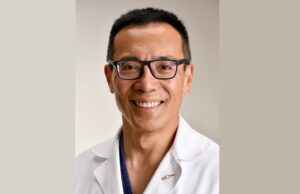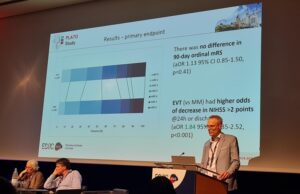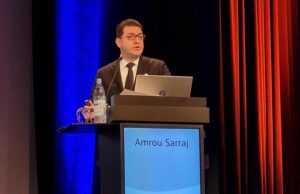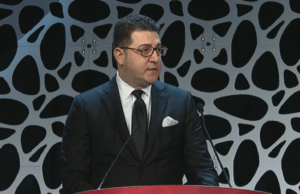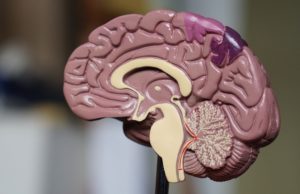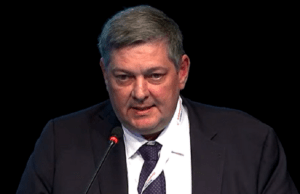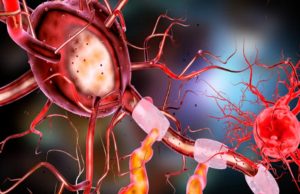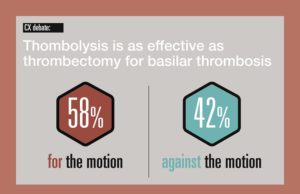Tag: evt
No-reflow in clinical studies: Causes, rates and implications for patient outcomes
In a guest article for NeuroNews, Adnan Mujanovic (Bern, Switzerland) discusses a relatively unknown but potentially significant factor in stroke patients experiencing poor clinical...
Endovascular therapy under general anaesthesia linked to improved functional outcomes versus...
The multicentre, randomised SEGA trial has found that acute ischaemic stroke patients who receive endovascular therapy (EVT) under general anaesthesia experience better functional outcomes...
Latest TRIAGE-STROKE and RACECAT data put the brakes on alternative stroke...
Recently published data from two large randomised controlled trials (RCTs) have indicated there may be minimal benefits—or even negative effects—associated with bypassing local or...
EVT with poor reperfusion linked to worse outcomes than medical management...
Endovascular therapy (EVT) treatments that achieve poor reperfusion have been found to result in inferior clinical outcomes compared to best medical management (BMM) in...
Is thrombectomy set to become the standard of care for medium...
With multiple large clinical trials currently underway to assess thrombectomy treatments in patients with medium vessel occlusion (MeVO) stroke, Johanna Ospel (Calgary, Canada) takes...
Vision recovery among potential benefits of endovascular therapy in PCA occlusion...
A multicentre study presented at the recent European Stroke Organisation Conference (ESOC; 24–26 May, Munich, Germany) has found that vision recovery and an increased...
MAGNA meta-analysis further supports clinical benefit of EVT in large-core infarct...
The MAGNA meta-analysis of individual patient data (IPD) has provided “strong, generalisable evidence” on the clinically meaningful benefits of endovascular therapy (EVT) in ischaemic...
TESLA trial misses primary endpoint but exhibits “strong suggestion” favouring endovascular...
The results of the TESLA trial were recently presented at the European Stroke Organisation Conference (ESOC; 24–26 May, Munich, Germany), demonstrating a “strong suggestion”...
Performance feedback significantly reduces door-to-groin time in endovascular therapy
Supplying healthcare providers with performance feedback can significantly reduce the time between an ischaemic stroke patient arriving at a hospital and them subsequently receiving...
MR CLEAN-LATE trial finds endovascular therapy safe and effective in late-presenting...
Endovascular therapy (EVT) has been deemed safe and effective in patients with ischaemic stroke caused by an anterior circulation large-vessel occlusion (LVO) who present...
US physicians publish “first reported use” of Indigo aspiration system for...
Physicians in the USA have published details of—to their knowledge—the “first reported use” of the Indigo aspiration system (Penumbra) to treat cerebral venous sinus...
ANGEL-ASPECT data bolster evidence for thrombectomy in large infarct core stroke
A randomised trial has found mechanical thrombectomy procedures performed within 24 hours of symptom onset to be more effective than standard medical care in...
SELECT2 results support thrombectomy use in stroke patients with large infarct-core...
An international clinical study has found that patients experiencing a ‘large’ stroke—characterised by a greater infarct-core volume on imaging—had a dramatically better recovery after...
Blood pressure lowering after EVT “should be customised” owing to safety...
The administration of medications to lower systolic blood pressure in acute ischaemic stroke patients who have undergone a successful mechanical thrombectomy procedure—also known as...
Meta-analysis including recent basilar trials signals benefit of EVT in posterior...
A meta-analysis of recent basilar artery occlusion trials—including ATTENTION and BAOCHE—has further indicated the potential benefits held by endovascular therapy (EVT) in treating posterior-circulation...
Interventions—not neuroimaging—found to be driving increased ischaemic stroke costs
A study by the Neiman Health Policy Institute (Reston, USA) has found that the costs of an ischaemic stroke episode increased by 4.9% from...
DISTAL trial will elucidate non-dominant M2, M3 and PCA occlusions but...
A recent update on the DISTAL randomised controlled trial (RCT)—which was delivered at the Barts Research and Advanced Interventional Neuroradiology (BRAIN) conference (5–8 December...
Direct thrombectomy fails to show non-inferiority versus bridging therapy in early...
The international DIRECT-SAFE trial has produced results indicating that intravenous thrombolysis (IVT) plus mechanical thrombectomy—commonly referred to as bridging therapy—should continue to be recommended...
World Stroke Congress bolsters evidence on optimal thrombectomy and thrombolysis approaches
While much-needed improvements to existing triage and transport protocols for acute stroke patients were a leading topic of focus on World Stroke Day (29...
BAOCHE trial results supporting thrombectomy for basilar artery stroke published in...
Results from the BAOCHE randomised controlled trial (RCT), which found that the addition of thrombectomy to standard medical care within 6–24 hours in basilar...
SNIS 2022: Research shows AI-based stroke diagnostics can expand access to...
A new study presented at the Society of NeuroInterventional Surgery’s (SNIS) 19th annual meeting (25–29 July, Toronto, Canada) shows that artificial intelligence (AI) technology...
Rare disease variant specific to East Asian patients increases post-EVT reocclusion...
Among people who received endovascular mechanical thrombectomy to remove a large vessel occlusion (LVO), those with a rare genetic disease variant found primarily in people...
AHA statement highlights need for more data on sex differences in...
A new American Heart Association (AHA) scientific statement has highlighted the need for more data about sex differences in the use of and response...
DISTAL: A landmark trial looking to elucidate endovascular treatment outcomes in...
In December 2021, University Hospital Basel (Basel, Switzerland) enrolled the first patient worldwide in the DISTAL study—a multicentre randomised controlled trial (RCT) evaluating the...
ATTENTION results indicate “we have finally conquered the basilar artery” with...
This year’s European Stroke Organisation Conference (ESOC 2022; 4–6 May, Lyon, France) saw results from ATTENTION—a multicentre randomised controlled trial (RCT) evaluating the benefit...
Study findings encourage direct EVT approaches over bridging thrombolysis in select...
A retrospective study involving more than 200 patients has indicated that ‘bridging thrombolysis’ may not be associated with improved functional outcomes in stroke patients...
Newer clot-busting medication may someday increase time window for stroke treatment
In a phase 2a clinical trial in China, the clot-busting medication tenecteplase has been shown to be effective in restoring blood flow to the...
AURORA: Evidence in favour of thrombectomy beyond six hours strengthened by...
Evidence favouring endovascular therapy (EVT) in anterior circulation stroke patients presenting with reversible cerebral ischaemia in the later time window (beyond six hours) from...
Hispanic stroke patients experience poorer post-thrombectomy outcomes than white counterparts
A study conducted by neurology researchers at University of Texas Southwestern (UTSW) Medical Center has found lower-quality functional outcomes for Hispanic ischaemic stroke patients...
Increased experience associated with shorter procedure times and better reperfusion rates...
Increasing levels of experience in performing mechanical thrombectomies have been associated with shorter procedural duration and better reperfusion rates in a multicentre study—with the...
LINNC 2021: ESCAPE-NEXT trial may bring “dream” of combining neuroprotection with...
At this year’s LINNC Paris Course (14–16 September, Paris, France and virtual), audiences heard that the ESCAPE-NEXT trial (sponsored by NoNO Inc.), which has already started enrolling...
Flying intervention teams lead to higher EVT rates and reduced time...
Flying teams of interventionists directly to a primary stroke centre to perform endovascular therapy (EVT)—as opposed to waiting for the patient to be transferred...
Benefits of EVT for basilar artery occlusion “cannot be excluded” following...
A randomised controlled trial (RCT) involving 300 patients found that functional outcomes among basilar artery occlusion stroke patients “did not differ significantly” with endovascular...
Repeated clot retrieval attempts linked to poorer functional outcome in acute...
Repeated clot retrieval attempts are associated with an increased rate of emboli to new territory (ENT) and greater infarct growth—resulting in poorer functional outcomes...
Thrombolysis versus thrombectomy: Honours even between basilar occlusion treatments in CX...
Thrombolysis is considered as effective as mechanical thrombectomy for the treatment of basilar artery occlusion (BAO)—despite existing evidence on both intervention options being limited....
Despite more stroke patients receiving EVT, racial disparities persist
A late-breaking science presentation at the International Stroke Conference (ISC) 2021 (17–19 March, online) reports that while the use of mechanical clot removal or...
No significant difference between IVT plus EVT compared with EVT alone
A late-breaking abstract presented at the International Stroke Conference (ISC) 2021 (17–19 March, virtual) reports results from the MR CLEAN-NO IV trial, which is...
New study reports no delay in EVT treatment during COVID-19 period
A study recently published in the BMJ reports no observed delay in the treatment of patients with intracranial occlusion with endovascular thrombectomy (EVT) during the...


